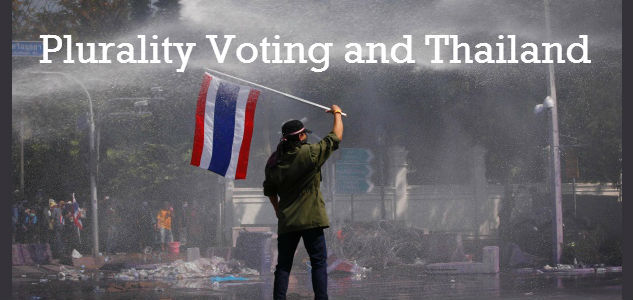
According to a new article in the from the ‘Behind the Numbers’ column of the Bangkok Post, a major Thai newspaper, there is open debate in Thailand about the basic structure of the country’s democracy following years of endemic political instability. The new article, “Who says voting is fair? Economists, Maybe“, co-authored by Benjarong Suwankiri and Warapong Wongwachara, is about the idea of moving beyond the plurality voting system for national elections as a political solution for Thailand.

As protests in Thailand have raged in this past week and more political instability has become inevitable, the idea of radical election method reform has begun to gain some traction. According to the article’s criticism of plurality voting, “spoiler candidates have been known to upset many close-call elections in the past. Modern researchers go as far as concluding that this inconsistency of social choice relative to individual choices could lead to ‘anything goes’ results in an election, depending on how one sets the agenda for voting.”
Plurality voting is used almost exclusively by democracies across the world but has come under increasing scrutiny by election reformers. Yet, the system that should replace plurality is not widely agreed upon which has encouraged experimentation in local elections in many different countries. The Thailand Post article considers the work of modern election method pioneers Professor Kenneth Arrow and the late Professor John Nash especially concerning the difference between cooperative and non-cooperative elections:
Once we start moving away from non-cooperative to cooperative types of games, we also change the set of questions one could ask. In a non-cooperative form, players ask questions about the cards in their hands, given the action of the other, i.e. an action-oriented approach. In contrast, cooperative games are result-oriented, focusing on what’s on the table and how to best allocate resources to ensure cooperation. Once we move here, a universe of possibilities opens up. Democracy, in the end, is a work in progress that each country will have to struggle to reshape until it fits better with local norms. Surely, if doing so was so simple, we wouldn’t have had this problem in the first place, would we?
Since 1932, when the absolute monarchy controlling Thailand was overthrown in a revolution, the country has nominally had a constitutional monarchy (yes, royalty) under a parliamentary democracy system. In reality, a long succession of military rulers have taken power through coups d’etat, including most recently in 2006. For a country that has had 18 constitutions since that 1932 revolution, election reform should be top priority.
According to Freedom House, the greatest thing since sliced bread, Thailand’s democracy is not easily pinned down as a total disaster:
Thailand is an electoral democracy. The July 2011 elections were considered relatively free and fair, yielding a strong victory for the opposition party Peua Thai. The polls replaced a government that had come to power as a result of judicial action and lacked a popular mandate. Although the influential military weighed in against Puea Thai during the run-up to the vote, it was unable to decisively affect the outcome. However, the Asian Network for Free Elections, a leading monitoring organization, reported that several political parties had representatives inside polling stations trying to influence voters’ choices, and that vote buying had increased compared with previous parliamentary polls.
Also, the authors of the article, Benjarong Suwankiri and Warapong Wongwachara, have added their email so that readers can contact them about the idea: tmbanalytics@tmbbank.com
Leave a Reply